

Zimbabwe: White Farmer Battles Mugabe's Top Aide in 'Last Minute' Scramble for Land. A white commercial farmer in Matabeleland South in southern Zimbabwe is battling to have President Robert Mugabe's top aide leave a prime property, in what critics view as a "last minute" scramble for land akin to the biblical "last supper".
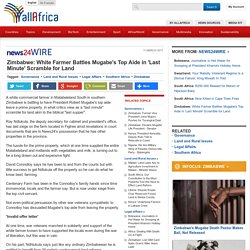
Ray Ndlukula, the deputy secretary for cabinet and president's office, has laid siege on the farm located in Figtree amid revelations in court documents that are in News24's possession that he has other properties in the province. The tussle for the prime property, which at one time supplied the entire Matabeleland and midlands with vegetables and milk, is turning out to be a long drawn out and expensive fight. David Connolloy says he has been to and from the courts but with little success to get Ndlukula off the property so he can do what he know best: farming. Centenary Farm has been in the Connolloy's family hands since time immemorial, locals and the farmer say.
But is now under siege from the top civil servant. 'Invalid offer letter' Last supper. Zimbabwe: Chinese Seek 65 Percent Stake At Kamativi, Mugabe Refuses to Bend Indigenisation Law. PRESIDENT Robert Mugabe refused to bend the indigenisation policy in favour of the Chinese who wanted a 65 percent stake at the Kamativi Tin Mine, minister Walter Chidhakwa has revealed.
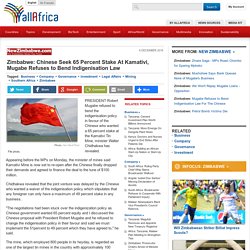
Appearing before the MPs on Monday, the minister of mines said Kamativi Mine is now set to re-open after the Chinese finally dropped their demands and agreed to finance the deal to the tune of $100 million. Chidhakwa revealed that the joint venture was delayed by the Chinese who wanted a waiver of the indigenisation policy which stipulates that any foreigner can only have a maximum of 49 percent stake in any business.
Black Empowerment; Mugabe Is Being Forced To Abandon His Platform. President Robert Mugabe’s most common message is a direct opposition of white superiority and a huge support for black empowerment.
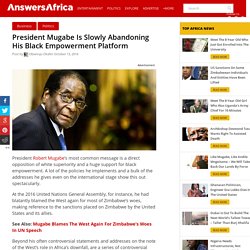
A lot of the policies he implements and a bulk of the addresses he gives even on the international stage show this out spectacularly. At the 2016 United Nations General Assembly, for instance, he had blatantly blamed the West again for most of Zimbabwe’s woes, making reference to the sanctions placed on Zimbabwe by the United States and its allies. See Also: Mugabe Blames The West Again For Zimbabwe’s Woes In UN Speech.
Zimbabwe: China Mega Deals On Course - Envoy. IMPLEMENTATION of the mega deals signed between Zimbabwe and China last December is on course with teams from both countries working flat out to ensure their success, China's top diplomat here has said.
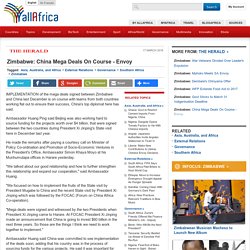
Ambassador Huang Ping said Beijing was also working hard to source funding for the projects worth over $4 billion, that were signed between the two countries during President Xi Jinping's State visit here in December last year. He made the remarks after paying a courtesy call on Minister of Policy Co-ordination and Promotion of Socio-Economic Ventures in the President's Office, Ambassador Simon Khaya Moyo at his Munhumutapa offices in Harare yesterday. "We talked about our good relationship and how to further strengthen this relationship and expand our cooperation," said Ambassador Huang.
"Mega deals were signed and witnessed by the two Presidents when President Xi Jinping came to Harare. "We are working very hard. Zimbabwe: Surrounded By Diamonds, Villagers Go Hungry in Drought-Hit Zimbabwe. By Andrew Mambondiyani Mutare — Shylet Mutsago, a 63-year-old who lives near the diamond fields of Marange, cannot hide her anger over how mining in this gem-rich part of eastern Zimbabwe has failed to improve the lives of local people.
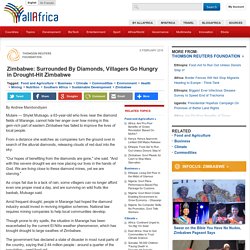
From a distance she watches as companies turn the ground over in search of the alluvial diamonds, releasing clouds of red dust into the sky. "Our hopes of benefiting from the diamonds are gone," she said. "And with this severe drought we are now placing our lives in the hands of God. We are living close to these diamond mines, yet we are starving. " As crops fail due to a lack of rain, some villagers can no longer afford even one proper meal a day, and are surviving on wild fruits like baobab, Mutsago said. Drought-Stricken Zimbabwe Declares State of Disaster. Cattle, thin like their owners, wander in a parched riverbed.
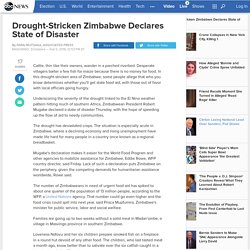
Desperate villagers barter a few fish for maize because there is no money for food. In this drought-stricken area of Zimbabwe, some people allege that who you know determines whether you'll get state food aid, with those out of favor with local officials going hungry. Zimbabwe: Zim Working On Diamond Bourse - Consultants Hired to Spearhead Project - Plans to Become Regional Trading Hub. African Law and Business - Articles - Zimbabwe: finally paving the way for foreign investment in transport infrastructure? Tatenda Mawere and Sharon Bwanya of MawereSibanda Commercial Lawyers in Harare, look at new legislation which could provide clarity for investors in infrastructure and transport in Zimbabwe.
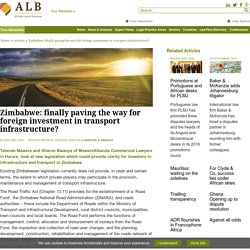
Existing Zimbabwean legislation currently does not provide, in clear and certain terms, the extent to which private players may participate in the provision, maintenance and management of transport infrastructure. The Road Traffic Act [Chapter 13:11] provides for the establishment of a ‘Road Fund’, the Zimbabwe National Road Administration (ZINARA), and roads authorities – these include the Department of Roads within the Ministry of Transport and Infrastructural Development, rural district councils, municipalities, town councils and local boards.
In Zimbabwe, the Urban Councils Act [Chapter 29:15] confers, among others, road infrastructure functions and powers of town councils, municipal councils and local boards. Councils may also contract with private persons for the provision of parking services. Zimbabwe: New Indigenisation Framework Unveiled. Photo: The Herald Zimbabwe's president Robert Mugabe.
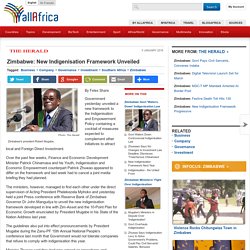
By Felex Share Government yesterday unveiled a new framework to the Indigenisation and Empowerment Policy containing a cocktail of measures expected to complement other initiatives to attract local and Foreign Direct Investment. Over the past few weeks, Finance and Economic Development Minister Patrick Chinamasa and his Youth, Indigenisation and Economic Empowerment counterpart Patrick Zhuwao appeared to differ on the framework and last week had to cancel a joint media briefing they had planned. Zimbabwe: Govt Overhauls Indigenisation. Photo: The Herald Indigenisation minister Patrick Zhuwao following a savage attack on Finance counterpart Patrick Chinamasa By Elias Mambo Government has reluctantly taken bold steps to overhaul and remove rough edges on its controversial indigenisation and economic empowerment policy in material changes expected to be announced today in a major climb-down as pressure has been brought bear on it by investors and critics, the Zimbabwe Independent can reveal.
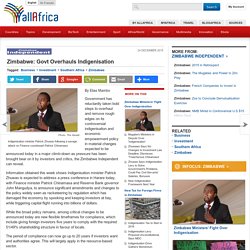
Information obtained this week shows Indigenisation minister Patrick Zhuwao is expected to address a press conference in Harare today, with Finance minister Patrick Chinamasa and Reserve Bank governor John Mangudya, to announce significant amendments and changes to the policy widely seen as racketeering by regulation which has damaged the economy by spooking and keeping investors at bay, while triggering capital flight running into billions of dollars. Zim car imports cost $4 billion. Business Reporter— ZIMBABWE has spent about $4,87 billion on car imports since 2009 as consumers continue to shun the limited and more expensive local market.
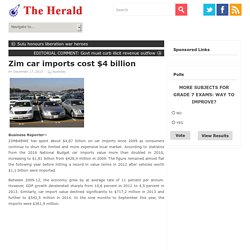
According to statistics from the 2016 National Budget car imports value more than doubled in 2010, increasing to $1,81 billion from $428,4 million in 2009. The figure remained almost flat the following year before hitting a record in value terms in 2012 after vehicles worth $1,1 billion were imported. Between 2009-12, the economy grew by at average rate of 11 percent per annum. However, GDP growth decelerated sharply from 10,6 percent in 2012 to 4,5 percent in 2013.
Zimbabwe to become region’s economic hub. Mr Bader Nasir Alhouti Felex Share Senior Reporter ZIMBABWE will soon be an economic hub in Southern Africa and Switzerland would not want to miss out on that opportunity, newly appointed Swiss representative to Zimbabwe, Mrs Ruth Huber said yesterday. Mrs Huber’s comments come hard on the heels of the release of the 2015 United Nations Development Programme report on Monday, that ranks Zimbabwe as having the fastest average growth in human development and the most improved quality of life in Africa. Mr Kumar Gupta Zimbabwe topped the 52 countries surveyed, among them Botswana, Namibia and South Africa. Think you know Zimbabwe? Here are 10 things that might just surprise you. ON Friday, July 3, Mail & Guardian Africa held a Zimbabwe Trade and Investment Forum at the Hyatt Regency in Johannesburg, South Africa, to explore ways in which businesses could help generate an economic comeback for the country. “Why?” , many asked ahead of the forum, “does Zimbabwe have anything to offer today?”
Yes, the country has an incredible history, and institutional strengths that can serve it well. Here we look at 10 things about Zimbabwe, some of which will surprise those who follow only its controversial political story: 1. 2. 3. 4. Zimbabwe’s FDI inflows up 36% to $545m in 2014 on mining, infrastructure. HARARE: Zimbabwe’s foreign direct investment leapt to $545 million in 2014 – less than 5 percent of the country’s GDP— from $400 million in the previous year. The spike was driven by interest in mining, infrastructure and services but the country still lags regional rivals, the latest United Nations world investment report has shown. Zimbabwe Investment Authority (ZIA) chief executive Richard Mbaiwa said investors had shown a keen interest in the capital intensive energy and mining sectors as the country re-engages with the international community.
Samsung to set up TV, fridge plant in Zim. KOREA-BASED telecoms manufacturing giant Samsung yesterday signed a $10 million deal with a local company, Cranbal Investments, that will see the international firm setting up a television and refrigerator assembly plant in Zimbabwe next year. Cranbal Investments is the majority shareholder in ART Corporation. Speaking at the signing ceremony in Harare, Cranbal Investments chairman Moses Chundu said they expected to spend $1 million on the television plant which would assembly TV sets ranging from 28 inches to 55 inches.
Chundu said the fridge assembly plant will also cost $1 million and would involve putting together over 15 parts to make chest freezers and the 3050 TMF model. “Knockdown kits for the first year of operation are valued in the range of $7 million financed from Korea. “After adding the value of the plant and fittings all to be financed from Korea, the investment scale is in excess of $10 million,” Chundu said.
“I hope we will see expansion and increase of trade with Korea. Zimbabwe prepares to sell beef to Russia. By By Ceaser Mhukahuru, in Harare , 01-Oct-2014Last updated on 01-Oct-2014 at 12:11 GMT. Zimbabwe: More Mega Deals Struck in China. Zim must catch up on 'wasted decade' The Telescope News - Zimbabwe targeting $2 bln worth of investments by 2018. Nigel Chanakira. Chinese investment up +5,000 percent. Martin Kadzere Harare Bureau CHINESE investment in Zimbabwe rose by more than 5,000 percent in the past five years, with the country now among Africa’s largest recipient of FDI from the world’s second-largest economy.This is according to statistics from the Chinese Embassy in Harare.
Annual FDI from China increased from $11,2 million in 2009 to $602 million last year as Chinese investors largely focused on mining, agriculture and manufacturing. Cumulatively, Chinese companies invested $1,3 billion over the past five years. Zimbabwe’s portion of Chinese investment into Africa increased from just 0,8 percent of $1,43 billion five years ago to 17,2 percent of $3,5 billion last year. Zimbabwe leads the world in solar-powered toll gates. While South African taxpayers cried foul at its government for failing to explore all options on e-tolling, Zimbabwe raced ahead to lead the world with the first installation of 22 solar-powered tollgates during 2013.
This solar power initiative falls within the country’s plan to upgrade its road transport services as part of an overall infrastructure improvement plan. Alternative Energy Africa. Swiss company Meeco Invest AG and Oxygen Africa’s Zimbabwean subsidiary Oxygen Group (Pty) Ltd. have formed a new JV to help progress solar power in Zimbabwe. Oursun Energy will help build PPPs to construct solar production facilities ranging between 10 MW to 100 MW.
Zimbabwe farm seizure turns black worker’s life around. Internet is ‘digital oxygen’ for Zimbabwe’s growth – government. Zimbabwe to Seize Mines While Compensating Banks. President Robert Mugabe’s government plans to seize control of foreign-owned mines without paying for them as part of a program to accumulate $7 billion of assets following his July 31 election victory, a minister said. Alternative Energy Africa. China remains Zimbabwe's top investor. HARARE, July 2 (Xinhua) -- China remained Zimbabwe's undisputed largest investor during the first five months this year, accounting for 74 percent of the 134 million U.S. dollars of the foreign direct investments pouring into the southern African country, the government's investment promotion agency said Tuesday. Chinese businesses invested 81.2 million U.S. dollars in the manufacturing sector, and another 16 million U.S. dollars in mining between January and May 2013, according to Zimbabwe Investment Authority.
The other top investors to Zimbabwe were Mauritius, investing 11 million U.S. dollars in mining and service sectors, and South Africa, injecting 7 million U.S. dollars in mining.